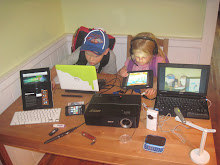It's fairly obvious that we live in a technologically-minded society. The problem is, our kids know more than we do! They are digital natives who are growing up with cell phones, iPods, netbooks, etc. If you're reading this, then you already know we use technology as a valuable resource tool in my classroom. Programs like Glogster, Audacity, Premier Tools and the SMARTboard help our children learn curriculum in a way they understand.
One problem that should concern us is the improper use of social media. Too many children have Facebook accounts, use MSN and of course text each other constantly. I'm not here to say, "STOP!", but I will say we need to be more knowledgeable of what our children are doing online. Cyber-bullying is now becoming the #1 form of bullying in today's society. Children are posting and writing personal information online, not realizing the digital footprint they are leaving...forever...for anyone to see...anywhere in the world!
I hope you have signed up for the Internet safety session at the Open House, here at Victoria. If you can't make it, I will be posting some of the information on our blog so you can be aware of certain precautions your children can take to stay safe.
In the mean time, check out the website link under "helpful websites" to learn how to make sure you're safe on the web ( ex: Facebook account is secure. F.Y.I. under the disclaimer for Facebook, you must be 13 years of age to be on Facebook!)
Wednesday, April 13, 2011
Sunday, March 27, 2011
Glogster
I thought giving a little preview of my Glog will help inspire you to use this new Web 2.0 tool during the Daily 5. Can you say "Book Report"?

Sunday, March 20, 2011
Earth Hour 2011
Earth Hour will be on Saturday March 26 at 8:30 p.m. I would like us all to try an participate during this event and shut off the lights, t.v.s and especially those computers (yes, I'm telling you this!). On Friday, we will be having our own earth hour by shutting off all the lights and computers and we'll be talking about this event throughout the week. For more information, go to http://www.earthhour.org/.
Thursday, February 3, 2011
Phonetic Punctuation
Podcast Powered By Podbean
To help us learn how punctuation affects our fluency when reading I have dig up a great old clip from a comedian named Victor Borge. Part of his act is something called Phonetic Punctuation. For every punctuation mark, he has assigned a sound effect. We're going to try this in class. I hope some brave souls let me record some of these for the podcast. The sounds that our class have chosen are in the above sound clip. Have fun!!
Wednesday, December 15, 2010
Human Body Research Project
Here is a copy of the guidelines if you are working on a disease or disorder. Remember that you have to state your resources (books, websites, etc), there must be research involved (if you have a relative who suffers from a disease, like cancer, they can help you will examples from their experiences but may no know all the treatments, discoveries, etc), and all projects have a written component (you can't just show videos or pictures on the SMARTboard).
Human Body
1. Choose a disease or disorder that affects a system, organ, part or structure of the body.
2. Use the guidelines below to help you research information about your disease/disorder. Remember that these are suggestions, include any information that you think is important.
Guidelines:
Who discovered your disease?
How did it get its name?
What type of people does it affect (race, gender, age)
What system of the body does it affect?
Causes or risk factors.
Describe the symptoms.
What does the disease do to the body?
Can it be prevented?
Is it treatable/curable?
Why did you choose to research this?
What are your reactions to your research?
Presentation Methods:
SMARTboard presentation
Newscast/ Video
Model/Diorama
Comic book / Storyboard
Examples of diseases/disorders
Diabetes Stroke
Asthma Downs Syndrome
Lou Gehrig’s Disease
Epilepsy


